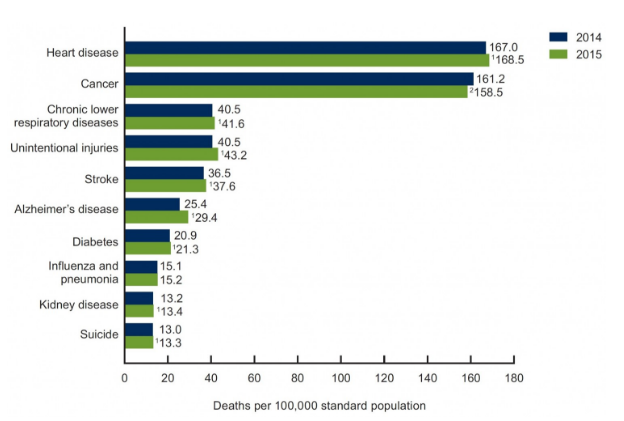Cancer deaths are falling in the United States, and that's great to see. On the other hand, fatalities caused by heart disease are on the rise and there's a significant increase in deaths attributed to Alzheimer's disease.
These are some of the top developments from 2015 included in the latest national report on life expectancy, recently released by National Center for Health Statistics, a department of the Centers for Disease Control and Prevention.
But the most significant and sobering news generated from the analysis shows that for the first time in 22 years, life expectancy for the average American has dropped. Last year it was 78.8 years, down from 78.9 years in 2014. Broken down by gender, men could expect to live 76.3 years (down from 76.5), while for women "life expectancy decreased 0.1 year from 81.3 years in 2014 to 81.2 years in 2015," according to the report.
The 10 leading causes of death were unchanged from 2014 to 2015 -- leading the way were (#1) heart disease, (#2) cancer, (#3) chronic lower respiratory disease and (#4) unintentional injuries -- but in eight of the 10 categories the death rate increased. (The chart below right is courtesy of the National Center for Heath Statistics / CDC.)
The rate of cancer deaths, due in part to a continued decrease in smoking and better awareness of the health damage caused by cigarettes, has dropped to 158.5 deaths per 100,000 people. That is down from 161.2 deaths in 2014. Better blood pressure treatment and cholesterol medication are other major factors for the decline. That said, cancer was responsible for more than 595,000 deaths in America last year.
 Smoking continues to fall out of favor. Meanwhile, those seeking to quit are increasingly embracing an array of harm reduction methods, including e-cigarettes, which are a safer nicotine-delivery method. The Council is proud to state that we've been a leader in advocating for all harm reduction options, and we will continue to be.
Smoking continues to fall out of favor. Meanwhile, those seeking to quit are increasingly embracing an array of harm reduction methods, including e-cigarettes, which are a safer nicotine-delivery method. The Council is proud to state that we've been a leader in advocating for all harm reduction options, and we will continue to be.
Another trend line, however, charting heart disease over the same 12 months, moved in the opposite direction. More than 633,000 people died from heart disease last year, up 3 percent from the 614,000 fatalities in 2014; meanwhile the death rate per 100,000 people rose 0.9 percent. The biggest reason for the increase is tied to the nation's ubiquitous overeating problem.
"Researchers say the obesity epidemic, which took off in the 1980s, is probably mostly to blame for the higher death rate from heart disease, because it has driven increases in rates of hypertension, diabetes and other heart-related problems," reports the Wall Street Journal. "Rates of obesity have risen substantially over the past several decades. According to the latest data from the CDC, 38.2% of adults between ages 20-74 and 20.6% of teens ages 12-19 are obese, compared with 14.5% of adults and 6.1% of teens of those ages in the early 1970s."
Combined, heart disease and cancer, the nation's top two killers, were responsible for 45 roughly percent of all fatalities in the United States last year.
As for deaths attributed to Alzheimer's disease (#6 of the top 10 causes of death), the CDC states there's been a noticeable increase, jumping from 25.4 deaths per 100,000 to 29.4 last year. But apparently the rise is largely statistical, due to greater reporting of the disease as opposed to more cases being diagnosed. However, fatalities linked to drug overdoses, which include those tied to the opioid addiction crisis that's struck a segment of middle-aged white men, is a significant factor in the increased death rate of unintentional injuries (category #4).
"Drug overdose deaths soared 11 percent to more than 52,000 last year, the most ever," reports the Associated Press, "driven by increases in deaths from heroin, prescription painkillers and other so-called opioids."
The last time average life expectancy fell was in 1993, when it dropped from 75.6 years to 75.4, a decline largely attributed to the nation's AIDS epidemic.
Japan has the world's highest life expectancy. According to 2014 statistics from the World Bank, the average Japanese citizen will live to be nearly 84 years old, five years longer than the average American.




